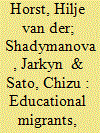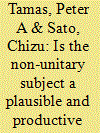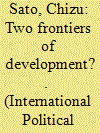|
|
|
Sort Order |
|
|
|
Items / Page
|
|
|
|
|
|
|
| Srl | Item |
| 1 |
ID:
167120


|
|
|
|
|
| Summary/Abstract |
Previous research on transnational migration and information and communication technologies (ICTs) demonstrated how ICTs shape transnational social relationships. What remains less explored is how ICTs shape spatial dimensions of such relationships. Also, international educational migrants constitute a substantial part of transnational migration flow, yet their everyday lives are not well studied. Building upon material semiotic scholarship, we examine how ICTs shape socio-spatial dimensions of transnational relationships in the lives of educational migrants, and the impacts that such relationships have on their everyday lives. This research is based on the empirical exploration of 21 in-depth interviews with educational migrants who came from Central Asian and African countries to the Netherlands. We show that spatial relationships, such as co-presence and distance, are not naturally ‘given’ but are instead enacted in heterogeneous communication practices of educational migrants, and these relationships produce both enabling and constraining effects on their everyday lives.
|
|
|
|
|
|
|
|
|
|
|
|
|
|
|
|
| 2 |
ID:
116862


|
|
|
|
|
| Publication |
2012.
|
| Summary/Abstract |
Development bureaucrats are the human instruments of the policies that mobilise funds, create organisations and underwrite interventions. For their home audiences development organisations need to present bureaucrats who are reliable instruments. In the field these same organisations need staff who can do what makes sense. This arrangement works until what makes sense in head office does not work in the field. At that point staff have to 'marry off' these two worlds. How these staff are understood shapes both how they can be approached by locals and how they should be supported by their organisations. This paper draws on research done in a donor organisation headquarters, in a military unit tasked with conducting development activities and at a field-level donor mission in a failed state. It explores the relevance, methods to research, the plausibility and the productivity of understanding the development bureaucrats who do this 'marrying off' as non-unitary subjects.
|
|
|
|
|
|
|
|
|
|
|
|
|
|
|
|
| 3 |
ID:
154041


|
|
|
|
|
| Summary/Abstract |
Since the economic crisis of the past decade, public development organizations have increasingly partnered with large private corporations to empower women through business. Existing feminist analyses focus on those public-private partnerships (PPPs) that are global, agenda-setting, benchmarking, and service initiatives. However, there are door-to-door initiatives that aim to empower women at the bottom of the pyramid (BoP) by turning them into entrepreneurs in the global South. At the same time, and unconnected to these Southern initiatives, PPPs in the global North attempt to empower middle-income women to care for distant others by consuming ethically. While these two kinds of PPPs are each identified in their own literatures as new frontiers in development, thus far they have not been studied together. Using transnational feminist literacy practices as a methodology, this paper reanalyzes existing studies on PPPs in the global South and North that target women’s empowerment and have thus far been overlooked. It finds parallels and linkages between PPPs in the global South and North. The use of transnational feminist literacy practices deepens our understanding of the mechanisms by which market-led, corporate-sponsored, “smart economic” and “win-win-win” development approaches, justified in the name of women’s empowerment, obscure and/or transform structural inequalities.
|
|
|
|
|
|
|
|
|
|
|
|
|
|
|
|
|
|
|
|
|